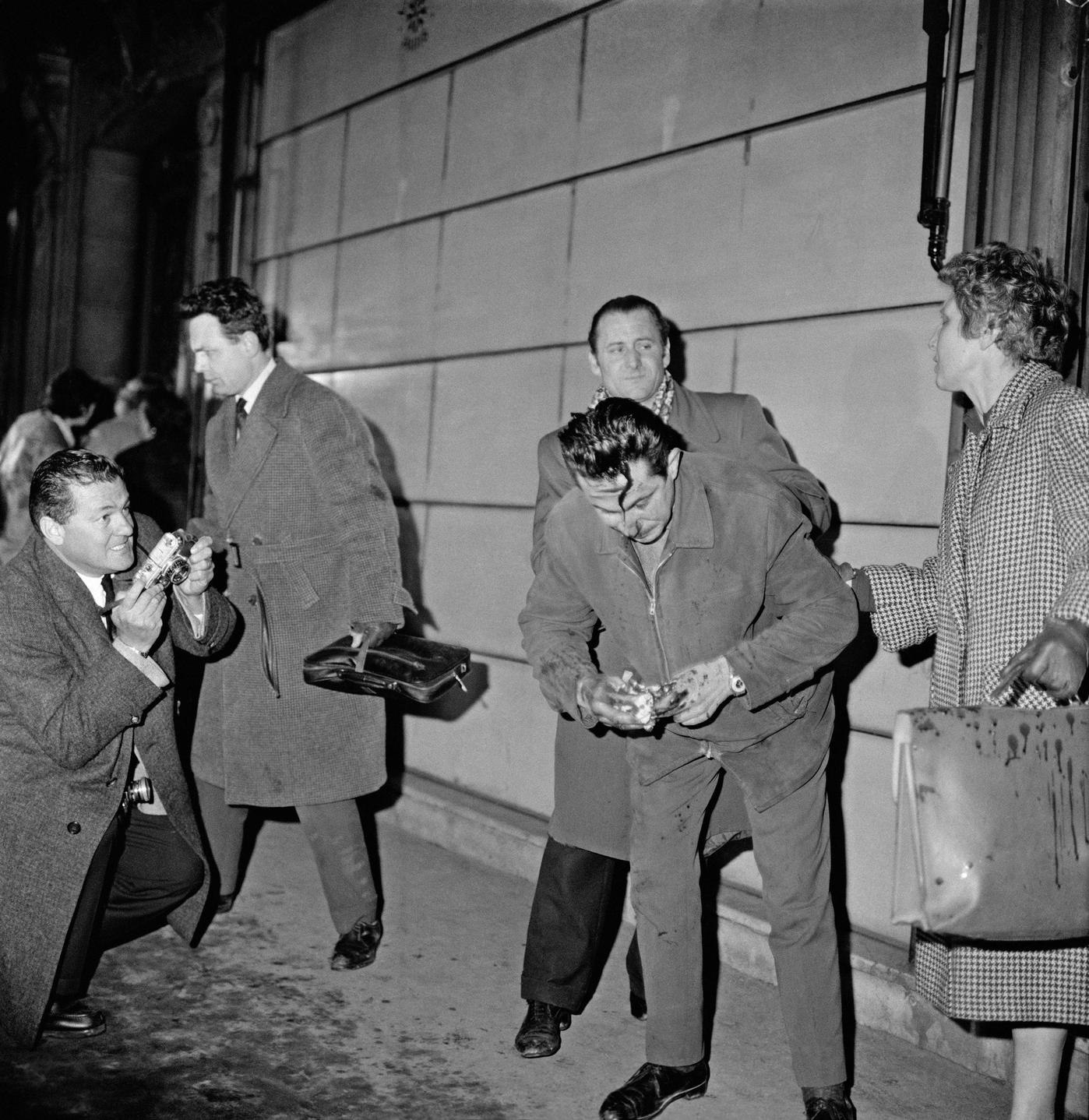This article is taken from the July 2025 issue of The Critic. To get the full magazine why not subscribe? Right now we’re offering five issues for just £25.
Riots are now a permanent feature of the Parisian lifestyle, just like train and metro strikes. But they are hardly new. Rioting happened before and during the Hundred Years’ War, the Wars of Religion in the 16th century and the Fronde, when idle Parisians threw stones at soldiers keeping the gates of Paris.
The First Republic of 1789 only lasted until Napoleon took over; both the absolute monarchy reinstated in 1814 and the constitutional monarchy of 1830 were terminated by riots.
The riots of 1848, marking the start of the Second Republic, precipitated the crowning of its only president, Louis-Napoléon Bonaparte, as Emperor Napoleon III. His defeat by the Prussian army in 1870 sparked a new wave of rioting with the Paris Commune. During the Third Republic (1870–1940), working-class strikes and riots took place in and around Paris, Lyon and Marseille.
As for “The” French Revolution, it was not the deed of impoverished peasants, nor did it benefit them. When Louis XVI acceded to the throne in 1774, abolishing serfdom, forbidding torture and pushing for financial reforms — eventually blocked by the parliament — that aimed to reduce the inequality between the clergy and the nobility on one hand and the third estate on the other, he was liked by the people.
Even the theory that financial strain caused by France’s intervention in the American War of Independence and the cold winters and warm summers between 1788–89 do not seem sufficient to explain the collapse of a thousand-year-old monarchy. Worse had happened during the reign of the Sun King, Louis XIV. Louis XVI’s failing was a consequence of the rise of the educated bourgeoisie since Louis XIV.
❂
When the Bastille was stormed, it only held a handful of inmates, amongst whom had been until a few days previously the Marquis de Sade. His pamphlet, Français, encore un effort si vous voulez être républicains, culminates with the rape of a mother by her daughter, starts with a critique of religious authority, then moves onto a defence of sexual freedom. This, according to Sade, would prevent civil upheaval. The best way to ensure that everyone’s needs are satisfied would be to establish brothels for both men and women.
Finally, in a parody of Antoine Lavoisier’s theory of mass conservation and of Pythagoras’ metempsychosis, the pamphlet explains that murder should not only be tolerated but encouraged, since “it is beyond human powers to prove that there may be any crime in the alleged destruction of a creature of any age, sex or species”. In a world of absolute equality under the law of nature, the fittest shall prevail.
What Sade spelled out for the Enlightenment, pushing its philosophy to its limits, is that radical freedom and equality will only turn tables on the powerful to put other people in their stead, who will behave just as badly. Indeed, after the monarchists, the first heads to fall were those of revolutionary leaders.
The Gilets Jaunes seemed closer to the medieval jacqueries than to 1789. So were, 20 years ago, the protests against the European Constitution and the regular objections to the undue pressure put on the French state by EU laws. Pouring manure and burning hay on the streets of Paris, as has been done regularly in the last five years, is a very early-modern-French-peasant-coded behaviour. But the educated bourgeoisie of today has no interest in supporting the peasants.
Violence gets more coverage than peaceful protests; it makes discontent visible
Until recent years, riots happened at the margins of a broader protest. Violence is usually blamed on casseurs — “breakers” — who infiltrate protests either for the sheer enjoyment of destruction or to undermine the cause from within. Violent protests get more coverage than peaceful ones.
Vandalising shops, cars and buses make the level of discontent visible. Most French people harbour discontent: ranting is part of the savoir-vivre à la française. But vandalism, too, is not new. The very word vandalisme was coined in the aftermath of the 1789 Revolution by Henri Grégoire, a priest favorable to the Revolution who became horrified by the destruction of artworks, palaces and churches. L’abbé Grégoire wrote that he “created the word in order to destroy the action”, arguing that the destruction of art goes against the French spirit and must have been the action of counter-revolutionary English spies.
❂
The use of the word “vandalism”, implicitly casting the blame on exotic “vandals” eager to destroy, is a way to keep one’s eyes shut to a country’s self-destruction. Today, just as in 1789, 1830, 1848 and 1870, those who destroy France are French. Whether one tries to separate the destroyers by pulling a cordon sanitaire around them, calling them “far-right mobsters” or “poorly integrated banlieue kids”, does not change the reality: the French are breaking their own country.
Most left-wing journalists now take it for granted that when the inhabitants of the banlieues riot, they do so with a level of grudge against France as a coloniser, then as a betrayer. Their argument is that France wrecked Algeria when colonising it, then failed to uphold its promises to the Algerian natives who went to live in France. The history is, unfortunately, a little more complicated.

As Driss Ghali argues in A Counterhistory of French Colonization, the French imperial enterprise in the 19th century happened almost by accident. By the time the Revolution began, France had sold or lost most of its American colonies. The conquest of Algeria, then a satellite of the Ottoman Empire, happened by chance. After a diplomatic incident in 1827 where the Ottoman regent Hussein Dey hit the French envoy with a fly-whisk, the French sent three ships to block Algerian ports.
France’s quick victory led to a problem: it is one thing to conquer a territory. To pacify and organise it is another. Unlike the Ottomans, the French did not rely on existing hierarchical tribal structures to establish their power. The Turks controlled Algeria with about 3,500 officers. The 100,000 soldiers France sent in the 1840s could not ensure that.
Furthermore, whilst the French in Algeria were favourable to peaceful cohabitation, with clear boundaries, mainland investors pushed for an exploitative colonisation.
Humiliated by the defeat by Prussia in 1870 and the annexation of Alsace and Lorraine by the new Germany, France saw overseas victories as a way to hold its head high in front of Britain. Whilst the turn of the century marked the start of the Anglo-French entente cordiale, France still sought to emulate the British Empire through rapid conquests in Africa and Asia.
Two world wars later, colonialism was out of fashion, and the independence of Algeria became an international cause célèbre. In 1957, the young senator John F. Kennedy declared: “The imperatives of Western unity and the need to sustain Western influence in the uncommitted areas of the world make the Algerian question one of the pivotal issues in world politics and in the balance of world power.”
Algeria had a particular position amongst the French colonies. It was closer than Martinique and Réunion. Administratively, it was entirely part of France, although severely lacking in official presence. In 1959, whilst France was discussing the citizenship status of Algerians, General de Gaulle told Alain Peyrefitte that France must have a clean break with Algeria. If all Algerians were integrated to the French population with equal rights, he added, his village of “Colombey-les-Deux-Églises” would become “Colombey-les-Deux-Mosquées”.
The diverging factions of Algerian independence, the National Liberation Front (FLN) and its army, the National Liberation Army, were not only attacking European and Arab civilians in Algeria but participating in socialist protests on the French mainland, too. The French police — heavy-handed with French socialist protestors — were far from lenient against the Algerians. Soon police violence in mainland France became a key argument to legitimise Algerian independence (even though both sides used torture within Algeria).
Despite the country’s independence in 1962, Algerian issues continued to echo within France. The historian Benjamin Stora argues that May 1968 in France was the first public protest movement where the issues of the working class and of decolonisation were thoroughly merged.
The French working class traditionally stood against the massive importation of low-wage workers. Les Événements de Mai ’68 changed that. The educated elite at the Sorbonne, initially protesting for men to have access to women’s dorms, decided to throw the Parisian paving blocks at the police to defend the rights of the working class and of immigrants.
❂
What Diderot and Voltaire did in the 18th century, Sartre did in the 1960s. Sartre’s existentialism argues that there is no objective morality and that individuals create their own code of conduct. This looks like a defence mechanism against what the Second World War had revealed: that horrible things are committed by normal people.
When, at the height of the Algerian crisis, Frantz Fanon published The Wretched of the Earth, fusing socialism with Pan-Africanism, Sartre’s preface to the book sounded like an unhinged shriek of panic-stricken self-hatred. Sartre suddenly remembers there is such a thing as morality — but only the West should be subjected to it. In order to make amends for the evils of colonisation, he writes, “our soil must be occupied by a formerly colonised people, and we must starve to death.”
Sartre supported Mao, Pol Pot and Khomeini. From the medieval jacqueries and the Revolutionary capitalist revolution, the modern French Left inherited the idea that all authority must be destroyed and that any group can be weaponised as a means of destruction. So that the Revolution may be justified, the Revolution must be permanent.
Riots with Algerian flags and Antifa balaclavas on the Champs-Élysées tell the same story as pitchforks around the Bastille in 1789. Ever since the 2005 referendum on the European Constitution, the demands of the French people, both right-wing and left, have been ignored in favour of pro-EU policies, whilst riots offer an evergreen interview topic for the political establishment.
But modern France’s riots cannot be blamed on marginal agitators, criminogenic architecture or systemic police violence. Though all these factors play their part in fostering the underlying tension, the reason why riots keep happening in France is that they gave birth to the Republic. And so, from riot to riot, post-Revolutionary France keeps looking for liberty, equality and fraternity, whirling around itself like a beheaded chicken.












